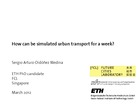How can be simulated urban transport for a week?
dc.contributor.author
Ordóñez Medina, Sergio A.
dc.date.accessioned
2018-11-22T07:16:47Z
dc.date.available
2017-06-10T07:35:59Z
dc.date.available
2018-11-20T19:38:38Z
dc.date.available
2018-11-21T07:44:43Z
dc.date.available
2018-11-21T09:53:26Z
dc.date.available
2018-11-21T10:45:34Z
dc.date.available
2018-11-21T13:03:32Z
dc.date.available
2018-11-21T14:09:27Z
dc.date.available
2018-11-22T07:14:27Z
dc.date.available
2018-11-22T07:16:47Z
dc.date.issued
2012-03
dc.identifier.uri
http://hdl.handle.net/20.500.11850/53913
dc.identifier.doi
10.3929/ethz-b-000053913
dc.description.abstract
MATSim is a large-scale multi-agent, activity-based transport simulation model. It can simulate each person in a urban area, managing millions of agents in reasonable computation times. Besides supply information, MATSim needs a planned activity schedule for every person as input data. Its time horizon is one day, and the activity-trip chains have to be fully defined before each simulation (start-time, duration, location, trip mode, and sequence for the entire day). MATSim scores the simulation, mutates agentsâ plans and executes a new simulation many times, optimizing the macroscopic indicators and reaching user equilibrium conditions. However, the one day time horizon is a hard restriction for studying current transport planning challenges using MATSim. Recent studies show that the behavioral variety of travelers can not be well analyzed with only one day simulation results. Usual analysis procedures, like clustering the population according to their travel behavior, need multi-day information to account for intra-personal variability. Furthermore, longer time horizons allow to include restrictions like time and money budgets, and to simulate individual mode choice over time, identifying mode clienteles. Developments of advanced time consumption travel models require observations of at least a week for calibration purposes, because a complete cycle of work and leisure must be included. In conclusion, time consumption decisions that humans take inside a day depend on individual and collective behaviors. These behaviors only can be simulated and analyzed with longer term models. Understanding the importance and pertinence of simulating transport with a multi-day time horizon, this paper discusses how MATSim can be expanded to execute one week time activity plans. The discussion is conceptual because no full implementation has been developed yet. The paper emphasizes two key aspects of the expansion: optimization strategies, and the generation of weekly plans. For each aspect alternatives are proposed, analyzed and compared. The impact of the proposed development on each step of the simulation process is taken into account. The problem of scheduling and re-scheduling and its relation to computational time in large-scale scenarios has to be kept in mind for weekly plans even more so than for daily plans. Activity plan generation procedures ranging from simpler, but faster methods to advanced ones, involving econometric approaches or complex mental processes, are compared. Concepts like fixed and floating activities, activity agendas or shared activities (within households or with social networks) have to be evaluated for their impact. Furthermore, several options for performing the optimization of plans are presented, highlighting their advantages and disadvantages (e.g. full-week re-planning or end-of-day re-planning). Computing time and memory consumption are taken into account according to previous measures and expected indicators. It is easy to realize that the mobility simulation (traffic flow) module does not need significant changes when the total time is modified. However, if a within-week re-planning strategy is implemented modifications in this module and its implications are explained and evaluated as well. The paper concludes with a proposed methodology for developing this MATSim extension.
en_US
dc.format
application/pdf
en_US
dc.language.iso
en
en_US
dc.publisher
IVT, ETH Zurich
en_US
dc.rights.uri
http://rightsstatements.org/page/InC-NC/1.0/
dc.title
How can be simulated urban transport for a week?
en_US
dc.type
Other Conference Item
dc.rights.license
In Copyright - Non-Commercial Use Permitted
ethz.size
15 p.
en_US
ethz.version.deposit
publishedVersion
en_US
ethz.event
3rd Workshop on Time Use Observatory (TUO 2012)
en_US
ethz.event.location
Santiago de Chile, Chile
en_US
ethz.event.date
March 21-23, 2012
en_US
ethz.notes
Conference lecture on 21 March 2012
en_US
ethz.publication.place
Zurich
en_US
ethz.publication.status
published
en_US
ethz.leitzahl
ETH Zürich::00002 - ETH Zürich::00003 - Schulleitung und Dienste::00022 - Bereich VP Forschung / Domain VP Research::08058 - Singapore-ETH Centre (SEC) / Singapore-ETH Centre (SEC)
en_US
ethz.leitzahl
ETH Zürich::00002 - ETH Zürich::00012 - Lehre und Forschung::00007 - Departemente::02115 - Dep. Bau, Umwelt und Geomatik / Dep. of Civil, Env. and Geomatic Eng.::02610 - Inst. f. Verkehrspl. u. Transportsyst. / Inst. Transport Planning and Systems::03521 - Axhausen, Kay W. (emeritus) / Axhausen, Kay W. (emeritus)
en_US
ethz.leitzahl
ETH Zürich::00002 - ETH Zürich::00012 - Lehre und Forschung::00007 - Departemente::02100 - Dep. Architektur / Dep. of Architecture::02655 - Netzwerk Stadt und Landschaft D-ARCH::02226 - NSL - Netzwerk Stadt und Landschaft / NSL - Network City and Landscape
en_US
ethz.leitzahl
ETH Zürich::00002 - ETH Zürich::00012 - Lehre und Forschung::00007 - Departemente::02100 - Dep. Architektur / Dep. of Architecture::02655 - Netzwerk Stadt u. Landschaft ARCH u BAUG / Network City and Landscape ARCH and BAUG
en_US
ethz.leitzahl
ETH Zürich::00002 - ETH Zürich::00003 - Schulleitung und Dienste::00022 - Bereich VP Forschung / Domain VP Research::08058 - Singapore-ETH Centre (SEC) / Singapore-ETH Centre (SEC)::08060 - FCL / FCL
ethz.leitzahl.certified
ETH Zürich::00002 - ETH Zürich::00012 - Lehre und Forschung::00007 - Departemente::02115 - Dep. Bau, Umwelt und Geomatik / Dep. of Civil, Env. and Geomatic Eng.::02610 - Inst. f. Verkehrspl. u. Transportsyst. / Inst. Transport Planning and Systems::03521 - Axhausen, Kay W. (emeritus) / Axhausen, Kay W. (emeritus)
en_US
ethz.tag
FCL1
ethz.date.deposited
2017-06-10T07:38:48Z
ethz.source
ECIT
ethz.identifier.importid
imp59364f9ed027399387
ethz.ecitpid
pub:87229
ethz.eth
yes
en_US
ethz.availability
Open access
en_US
ethz.rosetta.installDate
2017-07-18T14:44:43Z
ethz.rosetta.lastUpdated
2024-02-02T06:39:36Z
ethz.rosetta.exportRequired
true
ethz.rosetta.versionExported
true
ethz.COinS
ctx_ver=Z39.88-2004&rft_val_fmt=info:ofi/fmt:kev:mtx:journal&rft.atitle=How%20can%20be%20simulated%20urban%20transport%20for%20a%20week?&rft.date=2012-03&rft.au=Ord%C3%B3%C3%B1ez%20Medina,%20Sergio%20A.&rft.genre=unknown&rft.btitle=How%20can%20be%20simulated%20urban%20transport%20for%20a%20week?
Files in this item
Publication type
-
Other Conference Item [18985]

